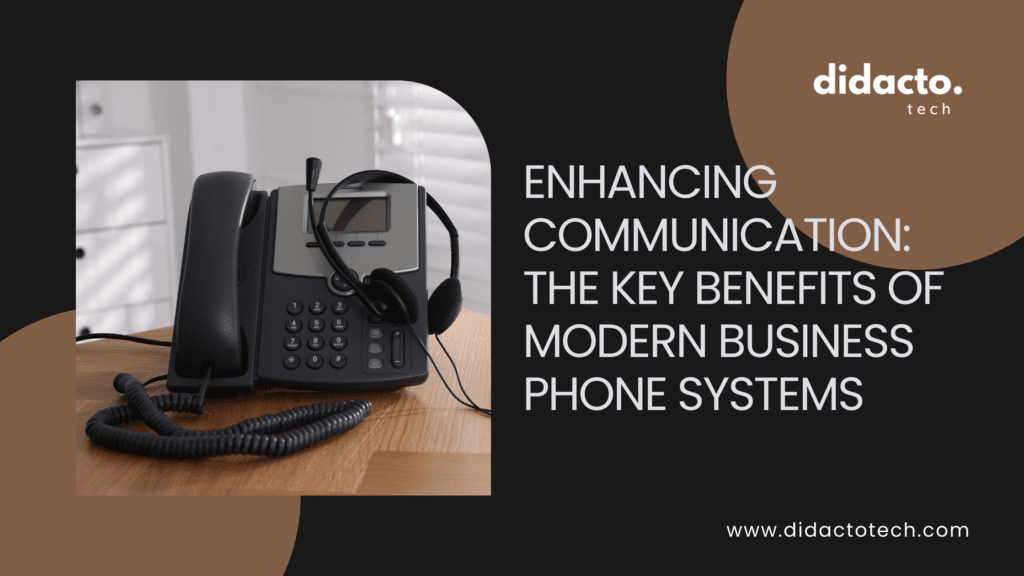Table of Contents
Introduction
In today’s rapidly evolving business landscape, effective communication stands as a cornerstone of success. As we navigate through the latest trends in business communication, it’s clear that the transition from traditional phone systems to modern, feature-rich platforms has revolutionized the way companies connect with customers and collaborate internally. This shift not only reflects advancements in technology but underscores the importance of efficient and effective communication mechanisms in driving business success.
Improved Customer Service
Immediate Response
In the modern business environment, customers expect quick and efficient responses to their inquiries. Modern business phone systems address this demand through advanced call routing features, significantly shortening wait times. By directing calls to the appropriate department or individual without delay, businesses can improve customer satisfaction and reduce the chance of potential frustration.
24/7 Availability
The advent of automated attendants in modern phone systems ensures that businesses can offer uninterrupted service, even after hours. This around-the-clock availability means customers can receive assistance at their convenience, thereby enhancing the overall customer experience.
Personalized Interactions
Tailored communication has become a key differentiator in customer service. Modern phone systems offer functionalities like call history and customer information integration, allowing businesses to personalize interactions. This level of customization can lead to a deeper connection with customers, encouraging loyalty and positive word-of-mouth.
Enhanced Mobility and Flexibility
Remote Connectivity
Today’s workforce is increasingly mobile. The integration of mobile devices with modern business phone systems enables employees to work effectively from anywhere, ensuring that business operations continue smoothly without being tied to a physical office location.
Scalability
As businesses grow, their communication needs evolve. Modern business phone systems allow for easy scaling, adapting to a company’s size and needs without significant infrastructure changes. This flexibility ensures that businesses can continue to communicate efficiently as they expand.
Unified Communications
The convergence of voice, video, and messaging into a single, seamless experience is a hallmark of modern phone systems. This integration facilitates a more streamlined and efficient communication process, enabling businesses to optimize their operations and enhance collaboration among team members.
Increased Reliability and Security
Uptime Guarantees
Dependability is crucial in business communications. Modern phone systems leverage robust infrastructure to offer uptime guarantees, ensuring that businesses remain connected to their customers and teams consistently.
Data Protection
In an era where data breaches can severely damage a company’s reputation, modern phone systems incorporate advanced security measures to protect confidential information. This focus on security not only safeguards against external threats but also builds trust with customers.
Disaster Recovery
Business continuity is a major concern for many companies. Effective backup solutions integrated into modern phone systems ensure that, in the event of a disaster, communication can be quickly restored, minimizing downtime and its associated costs.
Cost Efficiency and Control
Predictable Expenses
With fixed monthly pricing models, modern phone systems allow businesses to budget more effectively. Knowing your communication expenses in advance can be a significant advantage in financial planning.
Reduced Infrastructure Costs
Cloud-based solutions have minimized the need for physical hardware, reducing infrastructure costs. This shift not only lowers expenses but also simplifies the maintenance and upgrading of communication systems.
Detailed Call Analytics
Modern phone systems offer detailed analytics, providing insights into call patterns, usage, and potential areas of unnecessary expenditure. Businesses can leverage this data to optimize their communication strategies and further reduce costs.
Integration with Business Tools and Ecosystems
CRM Integration
Direct linkage between phone systems and Customer Relationship Management (CRM) platforms can significantly enhance customer service and sales efforts. This integration allows for a more cohesive view of the customer, improving efficiency and effectiveness in communication.
Productivity Tools Connection
Connecting phone systems with email, calendars, and collaboration apps streamlines workflows and improves organizational efficiency. This synergy between communication and productivity tools can lead to significant time savings and reduced operational complexities.
Customizable Features
Modern phone systems offer a range of customizable features, allowing businesses to tailor the system to their specific processes and needs. This adaptability ensures that the communication platform can grow and evolve in tandem with the business.
Conclusion
The transition to modern business phone systems represents a significant leap forward in how businesses communicate, both internally and with their customers. By embracing these systems, companies can enjoy improved customer service, enhanced mobility and flexibility, increased reliability and security, and greater cost efficiency and control. In addition, the ability to integrate with a wide array of business tools and ecosystems can further streamline operations and boost productivity. As we reflect on these benefits, it becomes clear that selecting the right phone system is not just about upgrading technology — it’s about unlocking the potential for greater business success. Now is the time for organizations to evaluate their communication needs and make a strategic decision that will propel them forward in today’s competitive landscape.
FAQs
-
What is the difference between VoIP and traditional phone systems?
The fundamental difference between VoIP and traditional phone systems lies in the medium they use for transmitting voice signals. Traditional phone systems, also known as Public Switched Telephone Network (PSTN) systems, utilize analog signals transmitted over copper wires. In contrast, VoIP technology converts voice signals into digital packets and transmits them over the internet or a local area network (LAN).
This distinction leads to several advantages for VoIP systems, including lower costs, enhanced scalability, and the integration of voice with other digital communication forms. Unlike traditional systems, which require dedicated lines and often involve substantial long-distance charges, VoIP enables businesses to leverage their existing internet connection, significantly reducing operational costs.
-
What are the advantages of a telephone system in an Organization?
Implementing a sophisticated telephone system in an organization can bring myriad advantages:
Cost Efficiency: Compared to traditional phone systems, modern telephone systems are more cost-effective, especially for businesses that make a lot of international calls.
Scalability: As your business grows, so can your phone system. Adding lines or features is often as simple as adjusting your service plan.
Flexibility and Mobility: Modern systems allow employees to connect to the office phone system remotely, enhancing the flexibility of working arrangements.
Improved Customer Service: Features such as call forwarding, voicemail to email, and auto-attendant can significantly improve the efficiency of communication, leading to better customer service. -
What does a business phone system do?
A business phone system serves as the linchpin for effective communication within an organization. At its core, it enables voice communication between staff within an organization and with clients, suppliers, and other external parties. Beyond just making and receiving calls, modern business phone systems offer a suite of features designed to streamline communication processes. These include voicemail, call forwarding, conference calling, and integration with mobile devices and computer systems, allowing for seamless communication regardless of location.
-
What is the purpose of a phone system?
The primary purpose of a phone system in any organization is to facilitate clear and efficient communication. Whether it’s a customer reaching out for support, a team member collaborating on a project, or a salesperson connecting with a potential client, a reliable phone system is crucial. It ensures that these interactions are as seamless and productive as possible. Moreover, in a broader sense, it supports the organization’s operational continuity, customer service, and the ability to scale communication efforts as the business grows.
-
Which phone service is the best for business?
Selecting the best phone service for your business depends on several factors, including the size of your organization, your budget, and specific communication needs. For many businesses, VoIP-based systems are preferred due to their cost-effectiveness, flexibility, and a wide range of features that support modern work practices, such as remote working. Providers like RingCentral, 8×8, and Vonage are often cited for their reliability, comprehensive service offerings, and robust customer support. Ultimately, the best service is one that aligns with your business objectives and enhances your communication capabilities.
-
What is a business phone?
A business phone, in the context of modern telecommunications, refers not just to a physical handset but to the complete system that supports business communications. This includes the technology—whether it’s VoIP, traditional PSTN, or hybrid systems—the service plans, and the features that these systems offer such as call handling, messaging, and conferencing capabilities. A business phone system is designed to support the complex needs of businesses, differing significantly from residential phone services in its scalability, functionality, and service assurance.




